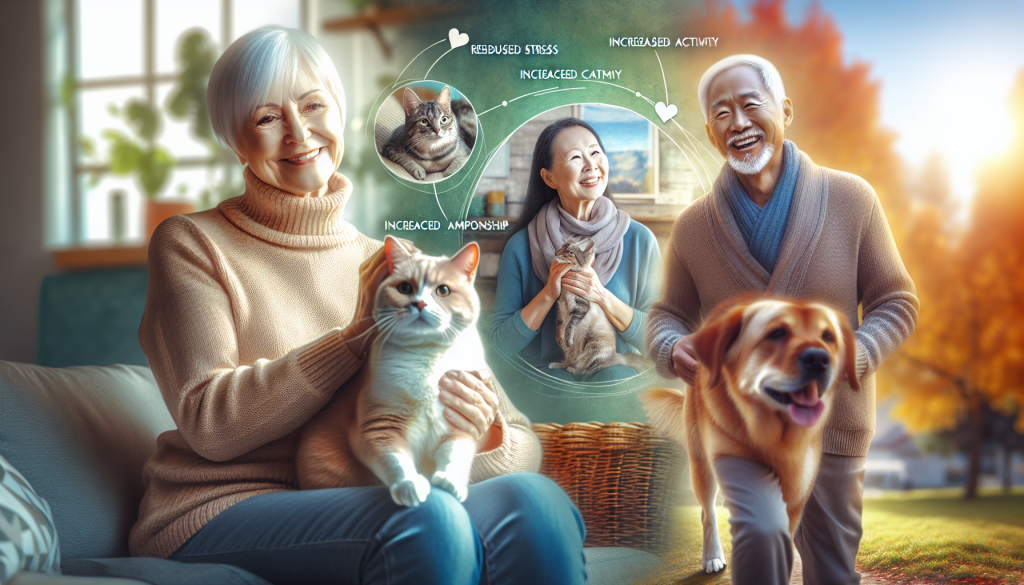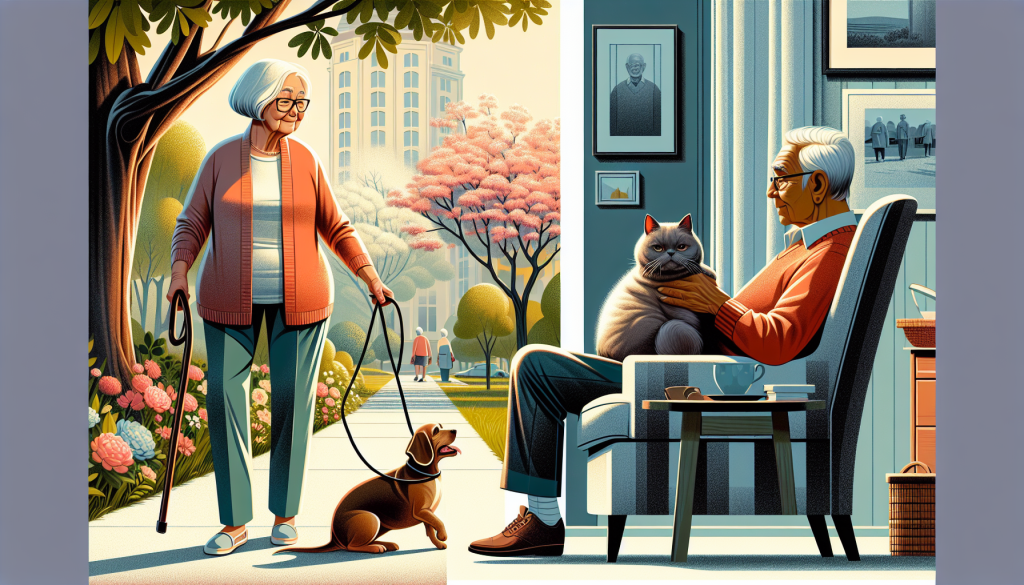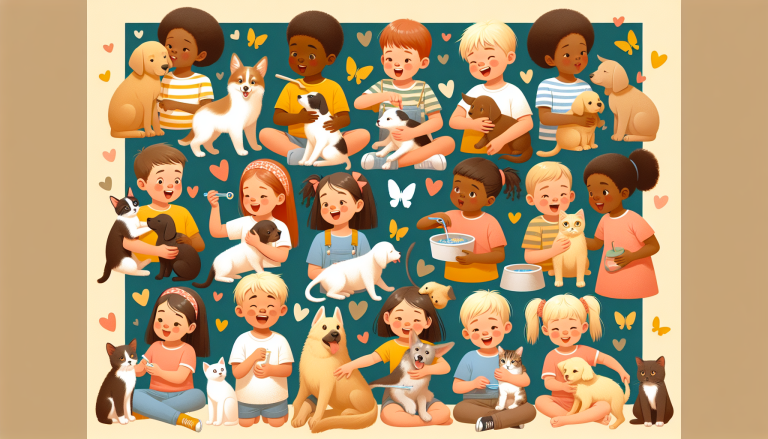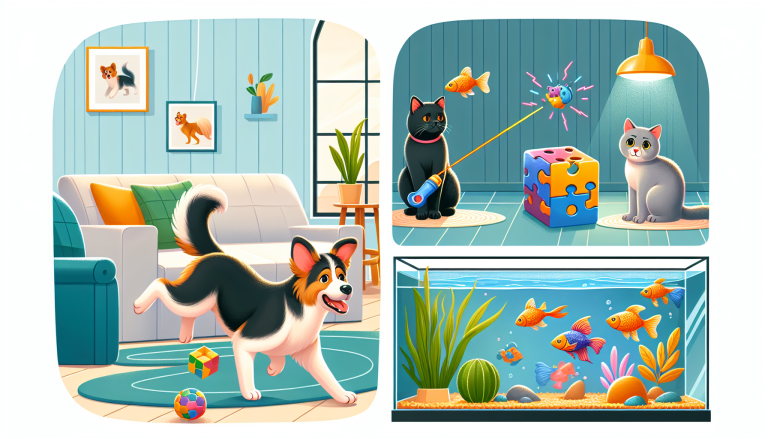As you embrace the golden years of your life, companionship becomes even more cherished. In this article, we explore the most beloved furry friends that bring joy and companionship to seniors. From the loyal and affectionate nature of dogs to the low-maintenance charm of cats, we delve into the world of pets that perfectly complement the lives of seniors. Discover which four-legged companions are the most popular among seniors and find your perfect match to create unforgettable memories together.
Table of Contents
ToggleDogs
Owning a dog can bring many benefits to seniors, both physically and emotionally. Dogs provide companionship and unconditional love, which can help combat loneliness and depression. They also encourage physical activity, as they need regular exercise and walks. Additionally, dogs can provide a sense of purpose and routine, as they rely on their owners for care and attention. For seniors looking to add a furry friend to their lives, here are some small, medium, and large dog breeds that are well-suited for senior owners.
Small Breeds for Seniors
Small breeds are often a great choice for seniors due to their manageable size and lower exercise needs. Breeds such as Chihuahuas, Shih Tzus, and Pugs are known for their affectionate nature and ability to adapt to apartment or small living spaces. These small dogs are often lap dogs, enjoying cuddling up with their owners and providing constant companionship.
Medium Breeds for Seniors
For seniors who still want a little bit more activity and playfulness from their furry companion, medium-sized dog breeds can be a good fit. Beagles, Cocker Spaniels, and Cavalier King Charles Spaniels are examples of medium breeds that are known for their friendly and gentle nature. These dogs enjoy regular walks and playtime but are also content to curl up on the couch with their owners.
Large Breeds for Seniors
While large dog breeds may require more physical activity, they can still be suitable for seniors who have the energy and capability to meet their needs. Breeds like Golden Retrievers, Labrador Retrievers, and Collies are known for their loyalty, intelligence, and gentle nature. These dogs often make excellent companions and can provide a sense of security to their senior owners.
Choosing the Right Dog for a Senior
When choosing a dog for a senior, it’s important to consider factors such as the senior’s lifestyle, physical abilities, and the dog’s temperament and exercise needs. Seniors with limited mobility may prefer a smaller breed that requires less exercise, while seniors who are more active may enjoy the companionship of a larger dog that can join them on walks and outings. It’s also essential to consider the senior’s living situation and any allergies or sensitivities they may have. Consulting with a reputable breeder or adoption agency can help seniors find the perfect four-legged friend.
Cats
Owning a cat can bring numerous benefits to seniors, providing them with companionship and a sense of purpose. Cats are known for their independent nature, which can be appealing for seniors who prefer a lower-maintenance pet. Here are some of the benefits of owning a cat and tips for choosing the right one for a senior.
Benefits of Owning a Cat
Cats can provide companionship and emotional support to seniors, particularly those who may be living alone or experiencing feelings of loneliness. Having a cat around can help reduce stress, lower blood pressure, and even decrease the risk of heart disease. Cats are also known for their ability to sense and respond to their owner’s emotions, offering comfort during difficult times.
Indoor vs. Outdoor Cats
For seniors, it is generally recommended to keep cats indoors to ensure their safety and well-being. Indoor cats have a lower risk of encountering hazards such as traffic, predators, or contagious diseases. Additionally, indoor cats tend to have longer lifespans and fewer health issues. However, providing enrichment and stimulation for indoor cats is crucial to keep them mentally and physically active.
Low-Maintenance Cat Breeds for Seniors
Certain cat breeds are known for their low-maintenance needs, making them ideal for seniors. Breeds such as the British Shorthair, Ragdoll, and Persian cats are typically calm, gentle, and less demanding in terms of exercise and grooming. These breeds are great choices for seniors who may have limited mobility or prefer a more laid-back cat.
Choosing the Right Cat for a Senior
When selecting a cat for a senior, factors such as the senior’s lifestyle, living situation, and preferences should be taken into consideration. Some seniors may prefer a younger cat that is more playful and energetic, while others may prefer a mature cat that is more settled and relaxed. Spending time interacting with different cats at shelters or breeders can help seniors find a cat that matches their personality and needs.
Birds
Bird ownership can be a unique and fulfilling experience for seniors. Birds are known for their vocalizations, captivating colors, and ability to form strong bonds with their owners. Here are some of the benefits of owning a bird and tips for choosing the right one for a senior.
Benefits of Owning a Bird
Birds can provide companionship and entertainment for seniors. Their cheerful chirping can bring joy and liveliness to a home, and their colorful plumage can be visually stimulating. Many bird owners also find great pleasure in teaching their feathered friends tricks and engaging in interactive play. Birds are also known for being highly intelligent creatures, capable of forming deep connections with their human companions.
Small Bird Species for Seniors
For seniors who prefer a smaller, low-maintenance pet, small bird species can be a great choice. Budgies (parakeets), cockatiels, and canaries are examples of small birds that are popular among seniors. These birds can be easily cared for in smaller living spaces and have lower exercise and grooming requirements.
Medium to Large Bird Species for Seniors
Seniors who have the time, space, and energy to devote to a larger bird may find great joy in owning medium to large species. African Grey parrots, Amazon parrots, and cockatoos are examples of medium to large bird species known for their intelligence, sociability, and ability to mimic sounds and speech. These birds require more mental stimulation, exercise, and larger cages to accommodate their needs.
Choosing the Right Bird for a Senior
When choosing a bird for a senior, it’s important to consider factors such as the senior’s living situation, experience with birds, and the level of interaction they desire. Some seniors may prefer a bird that can talk or sing, while others may prefer a bird that is quieter and more independent. Researching different bird species and consulting with avian experts can help seniors make an informed decision and find the perfect feathered companion.
Fish
Owning fish can provide seniors with a visually appealing and low-maintenance pet option. Watching the graceful movements of fish in an aquarium can be both relaxing and therapeutic. Here are some of the benefits of owning fish and tips for choosing the right species for seniors.
Benefits of Owning Fish
Keeping fish as pets offers numerous benefits for seniors. The serene and calming presence of an aquarium can help reduce stress and anxiety, contributing to improved mental well-being. Additionally, maintaining an aquarium can provide a routine and sense of responsibility for seniors, which can be particularly beneficial for those looking for a low-maintenance pet.
Low-Maintenance Fish Species for Seniors
Certain fish species are known for their ease of care and low-maintenance needs, making them ideal for seniors. Some examples include betta fish, guppies, and goldfish. These fish species have straightforward dietary and housing requirements, making them suitable for seniors who may have physical limitations.
Setting Up an Aquarium for Seniors
When setting up an aquarium for seniors, it’s important to consider factors such as the size of the tank, filtration system, and the ease of maintenance. Opting for a smaller tank with a simple filtration system can make it easier for seniors to manage. Providing clear instructions and demonstrations on feeding and cleaning routines can also ensure that seniors feel confident in taking care of their fish.
Rabbits
Rabbits can make delightful pets for seniors, offering companionship and affection. These small, furry creatures can bring joy and a sense of purpose to a senior’s life. Here are some of the benefits of owning a rabbit and tips for choosing the right one for a senior.
Benefits of Owning a Rabbit
Rabbits can provide companionship and emotional support to seniors, particularly those who may be looking for a low-maintenance pet. Rabbits are known for their gentle and affectionate nature, and many rabbits enjoy being petted and cuddled. Interacting with rabbits can also promote relaxation and reduce stress, as their soft fur and rhythmic breathing can have a soothing effect.
Choosing the Right Rabbit for a Senior
When choosing a rabbit for a senior, it’s important to consider factors such as the rabbit’s age, breed, and temperament. Some seniors may prefer a younger rabbit that is more playful and energetic, while others may prefer a mature rabbit that is already litter trained and settled in its behavior. Consulting with rabbit breeders or visiting shelters can help seniors find the right rabbit that matches their preferences and capabilities.
Caring for a Rabbit
Caring for a rabbit involves providing a suitable living environment, proper nutrition, and mental and physical stimulation. Rabbits require a spacious and secure enclosure that allows for exercise and exploration. A balanced diet consisting of hay, fresh vegetables, and adequate water is crucial for the rabbit’s health. Additionally, providing toys, tunnels, and opportunities for social interaction can keep rabbits mentally stimulated and prevent boredom.
Hamsters and Guinea Pigs
Hamsters and guinea pigs can make wonderful pets for seniors seeking smaller companion animals. These small rodents offer affection and entertainment, providing seniors with a sense of joy and purpose. Here are some of the benefits of owning a hamster or guinea pig and tips for choosing the right one for a senior.
Benefits of Owning a Hamster or Guinea Pig
Hamsters and guinea pigs can provide companionship and comfort to seniors who may be living alone or experiencing feelings of loneliness. These small rodents are known for their playful and curious nature, often engaging in entertaining antics that can bring joy to their owners. Interacting with these furry creatures can also have a therapeutic effect, helping to reduce stress and anxiety.
Choosing the Right Small Rodent for a Senior
When choosing a small rodent for a senior, it’s important to consider factors such as the senior’s living situation, available space, and the level of interaction desired. Hamsters are generally low-maintenance pets and are well-suited for seniors who prefer independent animals. Guinea pigs, on the other hand, are more sociable and require daily social interaction and a larger enclosure.
Caring for a Hamster or Guinea Pig
Caring for a hamster or guinea pig involves providing a suitable habitat, nutritious food, and regular handling and socialization. These rodents require secure and appropriate-sized cages or enclosures that allow for exercise and exploration. Providing a balanced diet of fresh vegetables, hay, and quality pellets is crucial for their health. Regular handling and social interaction with humans can help build trust and strengthen the bond between the pet and the senior.
Reptiles
Reptiles can offer a unique and low-maintenance pet ownership experience for seniors. These cold-blooded creatures can provide companionship and fascination, particularly for those who have an interest in exotic pets. Here are some of the benefits of owning a reptile and tips for choosing the right one for a senior.
Benefits of Owning a Reptile
Reptiles can offer a sense of tranquility and intrigue to seniors. Watching these creatures bask in their habitats or engage in slow and deliberate movements can be both soothing and captivating. Reptiles are also generally low-maintenance pets, requiring less social interaction and exercise compared to mammals or birds.
Low-Maintenance Reptiles for Seniors
Certain reptiles are known for their low-maintenance needs, making them suitable for seniors. Some popular choices include leopard geckos, bearded dragons, and ball pythons. These reptiles have straightforward dietary requirements, simple housing needs, and typically require less handling or social interaction.
Choosing the Right Reptile for a Senior
When choosing a reptile for a senior, it’s important to consider factors such as the senior’s comfort level with handling and their living situation. Some reptiles, such as snakes, may not be suitable for seniors who are uncomfortable with the idea of feeding or handling prey animals. Consulting with reptile experts or visiting reptile shows can help seniors make an informed decision and find the right reptile to suit their preferences.
Horses
Horse ownership can offer unique benefits to seniors, particularly those who have a love for these majestic animals and enjoy being in nature. Horses can provide companionship, physical activity, and a sense of purpose. Here are some of the benefits of owning a horse and tips for choosing the right one for a senior.
Benefits of Owning a Horse
Owning a horse can provide seniors with a sense of freedom and a connection to the outdoors. Horses require regular exercise, which can help seniors maintain their physical fitness and mobility. Interacting with horses also offers mental and emotional benefits, promoting relaxation, confidence, and a sense of accomplishment.
Horseback Riding for Seniors
For seniors who may not be able to own a horse themselves, horseback riding can still offer numerous benefits. Therapeutic riding programs or horseback riding lessons can provide seniors with the opportunity to engage with horses, improve balance and coordination, and experience the joy of horsemanship.
Choosing the Right Horse for a Senior
When considering horse ownership, it’s important for seniors to assess their physical abilities, experience level, and available resources. Seniors may opt for a horse with a calm and gentle temperament, suitable for leisurely trail rides or light riding. Consulting with experienced equestrians or trainers can help seniors find a suitable horse that matches their capabilities and goals.
Exotic Pets
For seniors looking for a unique pet ownership experience, exotic pets can provide a sense of fascination and intrigue. However, owning an exotic pet comes with its own set of considerations. Here are some of the benefits of owning an exotic pet and tips for choosing the right one for a senior.
Benefits of Owning an Exotic Pet
Exotic pets can offer a sense of wonder and a unique companionship experience for seniors. These unusual creatures, such as reptiles, amphibians, or small mammals like sugar gliders or hedgehogs, can provide visual interest and a learning opportunity for seniors interested in different species.
Exotic Pets Suitable for Seniors
When considering an exotic pet, it’s important to choose one that is suitable for a senior’s capabilities and lifestyle. Some exotic pets may have specific dietary and environmental requirements that can be challenging to meet. Researching the needs and care requirements of different exotic species, as well as consulting with exotic pet experts, can help seniors make an informed decision.
Unique Considerations for Exotic Pets in Senior Homes
Bringing an exotic pet into a senior home requires careful consideration of the living environment and potential health risks. Some exotic pets may require specialized enclosures or equipment to maintain proper temperature, humidity, or lighting. Seniors should also be aware of any allergies or sensitivities they may have to certain exotic species.
Senior-Friendly Pet Care Tips
Caring for a pet as a senior comes with its own set of considerations. Here are some tips to ensure senior-friendly pet care.
Choosing an Age-Appropriate Pet
When adopting a pet as a senior, it’s important to consider the age of the pet. Younger pets may be more energetic and require more hands-on care, while older pets may have specific health needs or behavioral issues. Assessing the senior’s energy levels, capabilities, and preferences can help match them with an age-appropriate pet.
Considering Physical Limitations
Seniors with physical limitations should consider the physical demands of owning a pet. It’s important to choose a pet that matches the senior’s physical capabilities, whether it’s a small dog that requires less exercise or a low-maintenance pet like a fish or reptile. Making modifications to the living environment, such as installing ramps or grab bars, can also make pet care more manageable.
Ensuring a Pet’s Safety
Creating a safe environment for a pet is crucial, especially for seniors who may have limited mobility or visual impairment. Removing hazards, securing loose cords or objects that pets can chew on, and providing appropriate containment or barriers can help prevent accidents and injuries.
Getting Help with Pet Care
Seniors who may need assistance with pet care should consider reaching out to family members, friends, or neighbors for support. This can include help with daily walks, transportation to veterinary appointments, or assistance with grooming and feeding. Additionally, there are often local pet care services or volunteer programs that can provide assistance to seniors who need help with their pets.
Regular Veterinary Care for Senior Pets
Regular veterinary care is essential for maintaining the health and well-being of senior pets. Seniors should schedule routine check-ups and vaccinations to ensure their pets’ medical needs are met. It’s important to establish a relationship with a trusted veterinarian who can provide guidance and address any concerns or age-related issues that may arise.
In conclusion, owning a pet can bring immense joy, companionship, and emotional support to seniors. Whether it’s a dog, cat, bird, fish, rabbit, hamster, reptile, horse, or even an exotic pet, seniors have a variety of options to choose from based on their preferences, capabilities, and living situation. The key is to match the pet’s needs and temperament with the senior’s lifestyle to ensure a harmonious and fulfilling relationship. With proper care, love, and attention, pets can become beloved companions and trusted friends for seniors, enhancing their overall quality of life.








